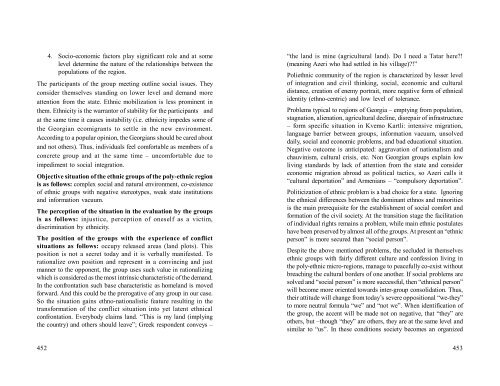socialuri usafrTxoebis eTnikuri aspeqtebi polieTnikur sazogadoebaSi
socialuri usafrTxoebis eTnikuri aspeqtebi polieTnikur sazogadoebaSi
socialuri usafrTxoebis eTnikuri aspeqtebi polieTnikur sazogadoebaSi
You also want an ePaper? Increase the reach of your titles
YUMPU automatically turns print PDFs into web optimized ePapers that Google loves.
4. Socio-economic factors play significant role and at somelevel determine the nature of the relationships between thepopulations of the region.The participants of the group meeting outline social issues. Theyconsider themselves standing on lower level and demand moreattention from the state. Ethnic mobilization is less prominent inthem. Ethnicity is the warrantor of stability for the participants andat the same time it causes instability (i.e. ethnicity impedes some ofthe Georgian ecomigrants to settle in the new environment.According to a popular opinion, the Georgians should be cared aboutand not others). Thus, individuals feel comfortable as members of aconcrete group and at the same time – uncomfortable due toimpediment to social integration.Objective situation of the ethnic groups of the poly-ethnic regionis as follows: complex social and natural environment, co-existenceof ethnic groups with negative stereotypes, weak state institutionsand information vacuum.The perception of the situation in the evaluation by the groupsis as follows: injustice, perception of oneself as a victim,discrimination by ethnicity.The position of the groups with the experience of conflictsituations as follows: occupy released areas (land plots). Thisposition is not a secret today and it is verbally manifested. Torationalize own position and represent in a convincing and justmanner to the opponent, the group uses such value in rationalizingwhich is considered as the most intrinsic characteristic of the demand.In the confrontation such base characteristic as homeland is movedforward. And this could be the prerogative of any group in our case.So the situation gains ethno-nationalistic feature resulting in thetransformation of the conflict situation into yet latent ethnicalconfrontation. Everybody claims land. “This is my land (implyingthe country) and others should leave”; Greek respondent conveys –“the land is mine (agricultural land). Do I need a Tatar here?!(meaning Azeri who had settled in his village)?!”Poliethnic community of the region is characterized by lesser levelof integration and civil thinking, social, economic and culturaldistance, creation of enemy portrait, more negative form of ethnicalidentity (ethno-centric) and low level of tolerance.Problems typical to regions of Georgia – emptying from population,stagnation, alienation, agricultural decline, disrepair of infrastructure– form specific situation in Kvemo Kartli: intensive migration,language barrier between groups, information vacuum, unsolveddaily, social and economic problems, and bad educational situation.Negative outcome is anticipated: aggravation of nationalism andchauvinism, cultural crisis, etc. Non Georgian groups explain lowliving standards by lack of attention from the state and considereconomic migration abroad as political tactics, so Azeri calls it“cultural deportation” and Armenians – “compulsory deportation”.Politicization of ethnic problem is a bad choice for a state. Ignoringthe ethnical differences between the dominant ethnos and minoritiesis the main prerequisite for the establishment of social comfort andformation of the civil society. At the transition stage the facilitationof individual rights remains a problem, while main ethnic postulateshave been preserved by almost all of the groups. At present an “ethnicperson” is more secured than “social person”.Despite the above mentioned problems, the secluded in themselvesethnic groups with fairly different culture and confession living inthe poly-ethnic micro-regions, manage to peacefully co-exist withoutbreaching the cultural borders of one another. If social problems aresolved and “social person” is more successful, then “ethnical person”will become more oriented towards inter-group consolidation. Thus,their attitude will change from today’s severe oppositional “we-they”to more neutral formula “we” and “not we”. When identification ofthe group, the accent will be made not on negative, that “they” areothers, but –though “they” are others, they are at the same level andsimilar to “us”. In these conditions society becomes an organized452 453


